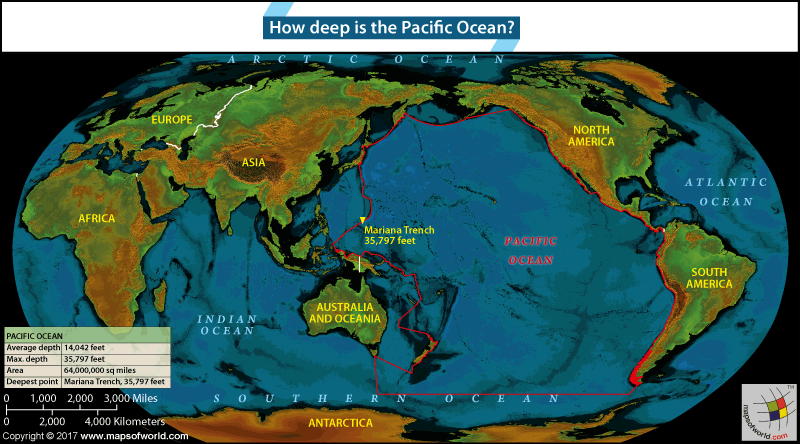How Deep is the Pacific Ocean?

The Pacific Ocean is the biggest and deepest ocean on Earth. It has a major impact on the world’s weather and is home to a wide variety of plants and animals. In this article, we will learn how deep is the pacific ocean, it’s maximum depth and more.
Depth of Pacific Ocean
The depth of the Pacific Ocean affects both life in the ocean and the environment around the world. It influences global weather patterns, ocean currents, and even the natural recycling of carbon. The extreme depths also create high-pressure environments that are home to unique creatures adapted to survive under such harsh conditions. Here’s a breakdown of its depths:
-
Average Depth
The Pacific Ocean’s average depth is about 13,215 feet (4,028 meters). This average depth includes the deep sea trenches as well as the shallower areas near coastlines, giving a middle value for its overall depth.
-
Maximum Depth
The maximum depth of the pacific ocean is found at a location called the Challenger Deep. This point reaches a depth of about 36,070 feet (10,994 meters), making it the deepest spot in all the world’s oceans.
-
Minimum Depth
The shallowest parts of the Pacific Ocean are usually close to the coast or in seas that are connected to the ocean, like the Sea of Okhotsk, the South China Sea, and the Bering Sea. These areas can be just a few hundred feet or meters deep.
-
Deepest Region
The deepest part of the Pacific Ocean is called the Mariana Trench. Its deepest spot, known as the Challenger Deep, goes down several miles beneath the ocean’s surface. The rest of the trench also has a very uneven and steep landscape.
Deepest Part of the Pacific Ocean
The Challenger Deep in the Mariana Trench is the deepest spot in the Pacific Ocean and the entire world. It’s located east of the Mariana Islands and goes down about 36,070 feet (10,994 meters). This part of the ocean is very cold and dark, with a lot of pressure, yet some unique sea creatures still manage to live there. Scientists continue to study this area and often discover new things about life in deep-sea environments.
How Big is the Pacific Ocean?
The Pacific Ocean is the biggest ocean in the world, stretching over more than 63 million square miles (163 million square kilometers). It reaches from the Arctic Ocean in the north down to the Southern Ocean in the south, and from Asia and Australia on one side to the Americas on the other. It covers about one-third of the Earth’s total surface, which is more than all the land combined. The Pacific Ocean greatly affects the world’s weather and is home to a wide variety of sea life and ecosystems, making it very important to our planet’s environmental and biological health.
Where is the Pacific Ocean Located?
The Pacific Ocean is positioned between Asia and Australia on one side and the Americas on the other. It reaches from the Arctic Ocean at the top all the way down to the Southern Ocean near Antarctica. This huge ocean stretches across a vast area, dividing the countries on the eastern side of Asia from those on the western sides of North America and South America. It also stretches from the cold Arctic waters down to the chilly regions near Antarctica.
Interesting Facts
- About 75% of the world’s volcanoes are in the Pacific Ocean area, in a zone called the “Ring of Fire.” This area also has a lot of earthquakes because it’s where many of the Earth’s tectonic plates meet and move against each other.
- The Pacific Ocean has hydrothermal vents. These vents shoot out water that is loaded with minerals and can be hotter than 700°F (370°C). Around these vents, special ecosystems exist where life forms survive without any sunlight. Instead of using sunlight to make food like most plants, these organisms use chemicals from the vents in a process called chemosynthesis.
- The Great Barrier Reef is the biggest coral reef in the world and it is located in the Pacific Ocean near Australia. It stretches for over 1,400 miles and is so large that you can even see it from space.
- The Great Pacific Garbage Patch is a huge area of ocean plastic waste located between California and Hawaii. It’s the biggest collection of ocean plastic in the world and is twice as big as the state of Texas.
Related Links